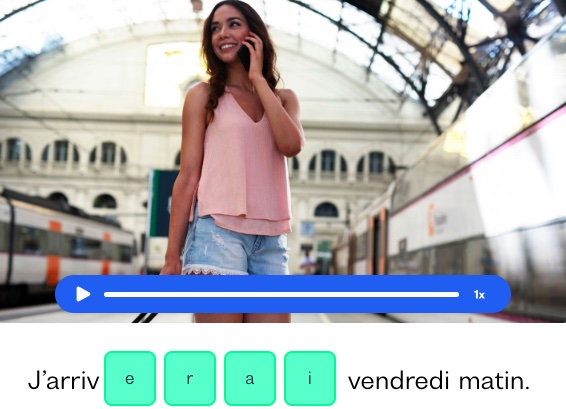Conjugating the Future Tense in French
A practical guide to future tense conjugation for French language beginners.
I want to learn...
What will the future look like once you’ve mastered the future tense in French? A lot of conversations are about what will happen in the future.
For example, deep and serious questions like “Where will I be in five years?” to questions designed to learn concrete information such as “What are you doing this summer?” take place in the future. This is even the case for the universally important question on everyone’s mind “What are we having for dinner tonight?”
Learning how to speak in the future tense when learning a foreign language is vitally important. Mastering this skill expands your ability to communicate on a wide range of topics and in a variety of time frames.
Future tense in French: The basics
In French, there are two ways to conjugate verbs in the future. The first is called the futur proche which, in English, means the “near future”. This makes it easy to remember when to use this conjugation because it is used for actions that are certain to happen in the immediate or near future.
For example:
-
Nous allons manger une pizza ce soir. (We’re going to eat pizza tonight)
-
Je vais aller à une soirée samedi prochain. (I’m going to go to a party next Saturday).
Conjugating the future tense in French: 3 Steps
Forming the near future in French is a breeze. Here are the three steps you need to remember if you want to make sure you can discuss your plans in French with friends.
Step 1
Let’s say you want to tell your friends that you’re going to work tonight. First, conjugate the helping verb aller in the present to je vais:
- Je vais. (I will / I am going)
Step 2
Keep the main verb in its infinitive form. Remember, the infinitive is the unconjugated form of the verb (travailler is the infinitive form meaning “to work”).
- travailler (to work)
Step 3
Put these two verbs together and you’re speaking in the futur proche.
- Je vais travailler ce soir. (I’m going to work tonight).
Negating the future tense in French
Of course, talking about the future doesn’t always mean talking about what you will do. It often means letting someone know what you won’t be able to do. This is pretty important, too and luckily, it’s not difficult to do.
In order to form a negative sentence in the futur proche, you simply surround the helping verb with ne…pas.
Let us break this down below:
Step one: You’ve got your sentence in the futur proche, right?
- Je vais travailler ce soir (I’m going to work tonight).
Step two: Luckily, your boss called and you don’t have to work after all! To let your friends know, identify the helping verb. In this case, it’s aller conjugated in the present:
- Je vais.
Step three: Surround the helping verb with ne…pas.
- Je ne vais pas travailler ce soir (I’m not going to work tonight).
Future tense in French with reflexive verbs
The last thing you need to know about conjugating in the futur proche is how to form it in sentences with reflexive verbs.
They are the verbs that include a reflexive pronoun in the infinitive form:
- se coucher (to go to bed)
- s’amuser (to have fun)
- se lever (to get up).
There’s just one extra step involved and you’ve got it: Keep the reflexive pronoun after the verb aller.
So, if you’re tired and ready to hit the hay you might say:
- Je vais me coucher (I’m going to go to bed).
Or, if you’re ready to party on Saturday night you could announce:
- Nous allons nous amuser samedi soir! (We’re going to have fun on Saturday night!).
Now that you are a whiz at conjugating the futur proche, it’s time to look at the futur simple.
These two ways of speaking about the future are similar, but the futur simple is not used for the immediate future. Instead, we typically use the futur simple to talk about plans, previsions, or actions that are a little further away in time.
Conjugating the future tense in French
Conjugating the futur simple is different than the futur proche.
You’ll start with the infinitive form of the verb. Then, you just need to add these endings to that infinitive form:
Future tense endings
| Subject Pronoun | Endings to the infinitive form of the verb |
|---|---|
| je / j’ | -ai |
| tu | -as |
| il / elle / on | -a |
| nous | -ons |
| vous | -ez |
| ils / elles | -ont |
So, let’s say you want to tell your parents that next year, you will visit France (lucky you!):
- Je visiterai la France l’année prochaine. (I will visit France next year).
See how that works?
- Visiter + -ai = visiterai
Let’s take a look at how the verb visiter looks with each ending on the table below:
Future tense endings: Visiter
| Subject Pronoun | Verb | English |
|---|---|---|
| je | visiterai | I will visit |
| tu | visiteras | You will visit |
| il / elle | visitera | He / she will visit |
| nous | visiterons | We will visit |
| vous | visiterez | You will visit |
| ils / elles | visiteront | They will visit |
This works exactly the same way for both -er and -ir verbs.
Now that we’ve seen an -er verb, let’s look at how the futur simple endings work for an -ir verb on the table below:
Futur simple endings for -ir verbs
| Subject Pronoun | Verb | English |
|---|---|---|
| je / j’ | ouvrirai | I will open |
| tu | ouvriras | You will open |
| il / elle | ouvrira | He / She will open |
| nous | ouvrirons | We will open |
| vous | ouvrirez | You will open |
| ils / elles | ouvriront | They will open |
The last thing to keep in mind with the future simple is how to tackle -re verbs (for more on French verbs, check out our article on French verb tenses).
But for the future simple, don’t worry! The verbs ending in -re work in the same way as the first two verb groups. You just need to remember to remove the “e” at the end of an -re verb before adding the same endings.
Take, for example, apprendre (to learn) in the table below:
Futur simple endings for -re verbs
| Subject Pronoun | Verb | English |
|---|---|---|
| je / j’ | apprendrai | I will learn |
| tu | apprendras | You will learn |
| il / elle | apprendra | He / She will learn |
| nous | apprendrons | We will learn |
| vous | apprendrez | You will learn |
| ils / elles | apprendront | They will learn |
Let’s try that in a sentence:
- Vous apprendrez le français! (You will learn French!).
See what we did there?
Now let’s take a look at the futur simple with être and avoir_.
Learn how to conjugate these two irregular verbs in the futur simple as presented in the table below:
Futur simple: Être
| Subject Pronoun | Verb | English |
|---|---|---|
| je | serai | I will be |
| tu | seras | You will be |
| il / elle | serait | He / She will be |
| nous | serons | We will be |
| vous | serez | You will be |
| ils / elles | seront | They will be |
Futur simple: Avoir
| Subject Pronoun | Verb | English |
|---|---|---|
| j’ | aurai | I will have |
| tu | auras | You will have |
| il / elle | aura | He / She will have |
| nous | aurons | We will have |
| vous | aurez | You will have |
| ils / elles | auront | They will have |
Now you know more about French future verbs and how to use them. Feel free to use some examples that we have shared in this article and use them in your conversations in French for you to be able to tell a story of what will happen in the future effectively!
Once you get to master the future verbs in French, it would be much easier for you to discuss in French with confidence and make plans for the future. We see a future that looks bright for you as you continue learning French with Busuu!
Want to keep learning French?
Keep the momentum going and continue learning French with Busuu’s free online courses and lessons designed to help you learn French in no time!

